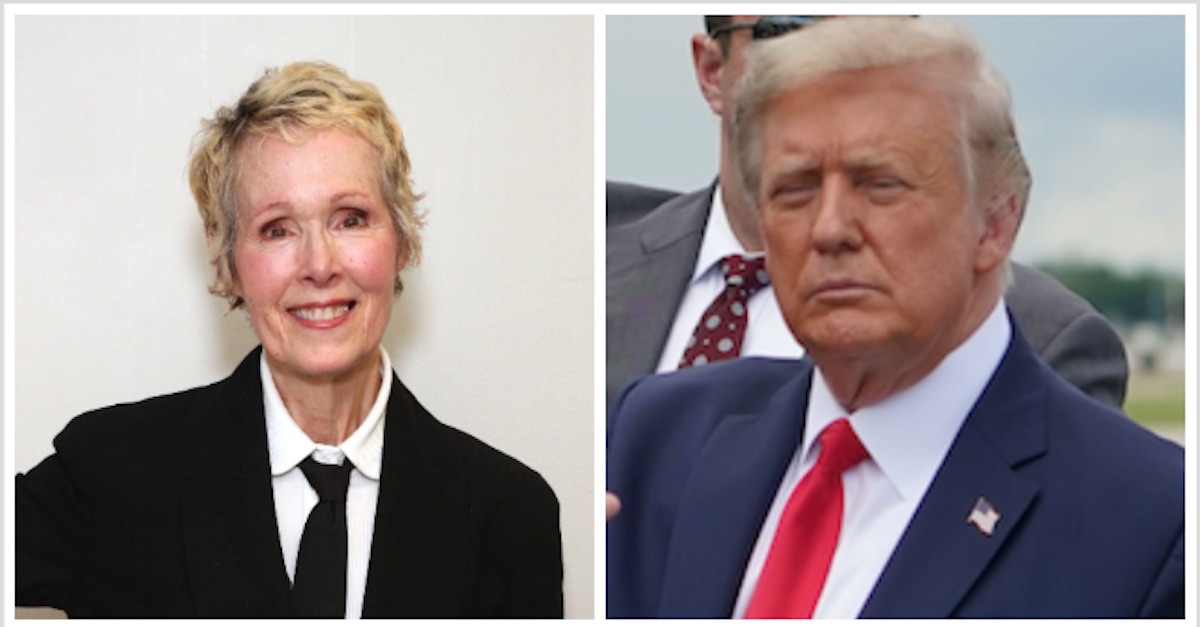
Overturning a federal judge’s ruling denying the former president immunity, the Second Circuit handed Donald Trump a procedural victory in his quest to shift possible liabilities in famed columnist E. Jean Carroll’s defamation lawsuit to the government.
The D.C. Court of Appeals now must decide whether Trump made his comments denying that he raped her — and insulting her appearance — over the course of his employment as president.
Nearly three years have passed since Carroll sued Trump in a New York state court for defamation. The lawsuit related to the then-president’s denials that he raped her in the dressing room of the department store Bergdorf Goodman in the 1990s. One of those remarks, made to the political publication The Hill, was: “She’s not my type.”
The Justice Department, both under the stewardship of former Attorney General Bill Barr and current Attorney General Merrick Garland, has taken the position that Trump made such remarks over the course of his duties as an “employee” of the federal government, entitling him to immunity under the Westfall Act.
On Tuesday, two members of the Second Circuit’s three-judge panel agreed that Trump was an “employee” under that statute. The majority then asked the D.C. Court of Appeals to determine whether Trump’s comments to reporters about an alleged sexual assault long predating his presidency counted as official actions.
For Senior U.S. Circuit Judge Denny Chin, a Barack Obama appointee dissenting with the ruling, the answers to both questions before them were clearly no.
“In the context of an accusation of rape, the comment ‘she’s not my type’ surely is not something one would expect the President of the United States to say in the course of his duties,” Chin’s dissent states. “Carroll’s allegations plausibly paint a picture of a man pursuing a personal vendetta against an accuser, not the United States’ ‘chief constitutional officer’ engaging in ‘supervisory and policy responsibilities of utmost discretion and sensitivity.'”
For the Second Circuit’s majority — U.S. Circuit Judges Guido Calabresi, a Bill Clinton appointee, and William Nardini, a Trump appointee — the latter question required a definitive answer from the D.C. Court of Appeals.
“In certifying, we wish to emphasize that the issue before us is totally separate from the substantive merits of the claim underlying this defamation action,” Calabresi wrote in the lead opinion. “That is, in evaluating the scope of employment issue, we do not pass judgment or express any view as to whether Trump’s public statements were indeed defamatory or whether the sexual assault allegations had, in fact, occurred. Those questions, which might loom large over this case at some point, are simply not before us in the present appeal.”
Calabresi and Nardini, however, did definitively answer whether a U.S. president qualified as a government “employee” under the Westfall Act — in the affirmative.
Judge Chin, in his dissent, wrote that the statute never intended to include a president.
“The President is in no respect the ‘servant’ of a ‘master,'” Chin wrote in the dissent. “Although he earns a salary, that point is extinguished by the FTCA’s ‘with or without compensation’ clause. […] No one exerts control over the President, and no one supervises the President’s day-to-day operations. The President is a constitutional officer who occupies the highest office in the United States. And the only discipline or punishment a President may face is impeachment for high crimes and misdemeanors.”
Throwing another wrench in the nearly three-year-old litigation, the Second Circuit’s ruling adds more uncertainty over a case already marked by extensive delay. It overturns rulings by presiding U.S. District Judge Lewis Kaplan, who excoriated Trump’s legal team from gumming up proceedings with procedural challenges.
Carroll’s legal team, for their part, recently signaled plans to file another lawsuit against Trump under New York’s Adult Survivors Act, once it goes into effect on Nov. 24, 2022. The lawyers said that they plan to file that case as a “related action” in the Southern District of the New York, the federal court to which the original case was transferred.
Reiterating plans to file that second lawsuit, Carroll’s lawyer Roberta Kaplan expressed confidence over the next court battle in a statement.
“As Judge Chin, the only Second Circuit judge to reach the merits, explained in his powerful opinion, Donald Trump was not acting within the scope of his duties as President when he defamed our client, E Jean Carroll because he was not serving any purpose of the federal government and because the comment ‘she’s not my type’ is not something one would expect the President of the United States to say in the course of his duties,” Kaplan wrote. “We are confident that the D.C. Court of Appeals, where this case is now headed on certification, will agree.”
A representative for Trump’s lawyer Alina Habba did not immediately respond to an email requesting comment.
Read the ruling, below: